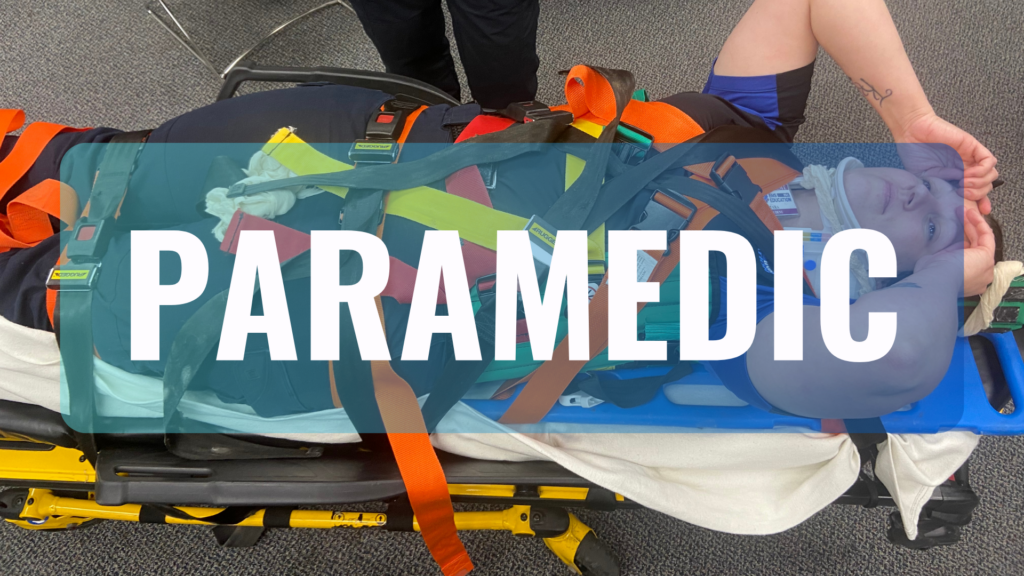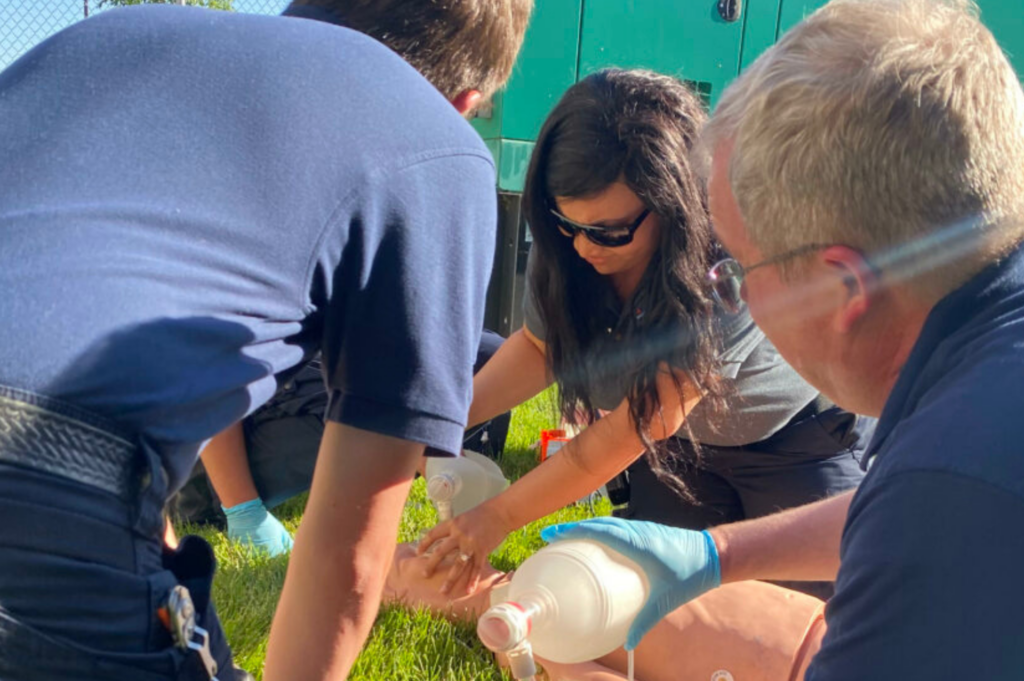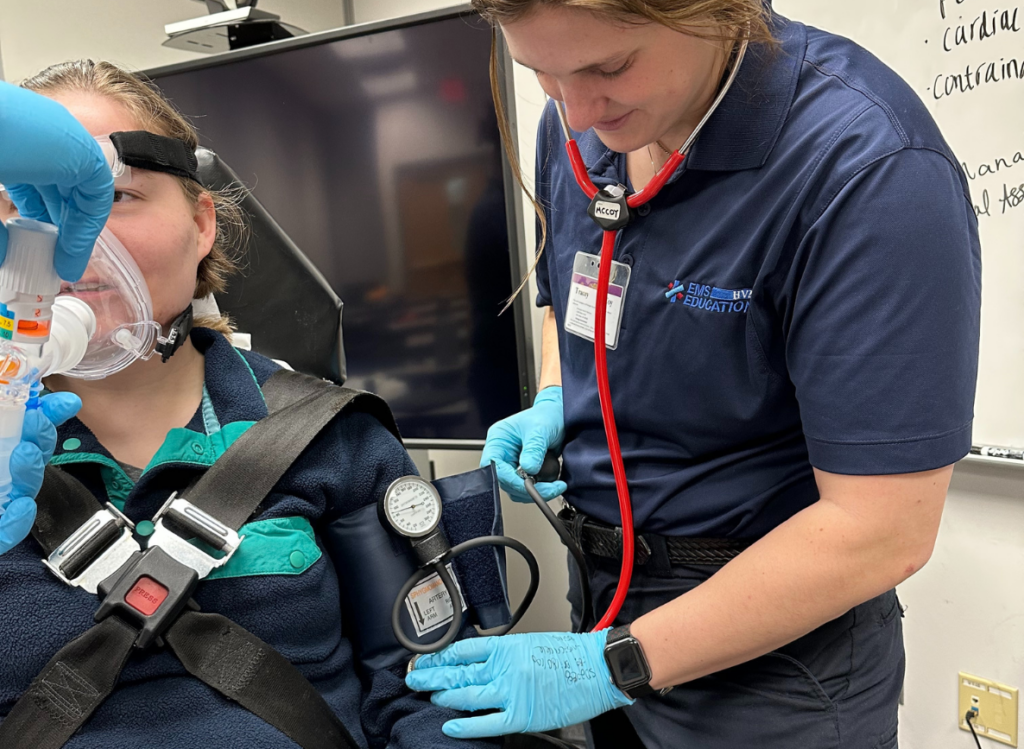© 2025 Emergent Health Partners, All Rights Reserved

Our results speak for themselves. See our paramedic program student outcomes here.
The HVA Center for EMS Education paramedic training program is a 14-month course totaling 1,200 classwork, lab, clinical, and internship hours. This course prepares students to take the National Registry paramedic exam, obtain paramedic licensure, and work as competent paramedics in the field.
The goal of the Center for EMS Education is to prepare Paramedics who are competent in the cognitive (knowledge), psychomotor (skills), and affective (behavior) learning domains to enter the profession.
The HVA Center for EMS Education’s paramedic program is approved by the MDHHS Division of EMS and Trauma and is accredited by the Commission on Accreditation of Allied Health Education Programs (CAAHEP) upon the recommendation of the Committee on Accreditation of Educational Programs for the Emergency Medical Services Professions (CoAEMSP).
To contact CoAEMSP:
8301 Lakeview Parkway
Suite 111-312
Rowlett, TX 75088
214-703-8445
Fax: 214-703-8992
Course model: This asynchronous program has virtual lecture options, independent online coursework, and in-person labs.
The first day of class is a mandatory in-person day. All students must report to Ann Arbor for the first day of class.
September 2, 2025 – October 20, 2026
Virtual lectures, independent online coursework, and in-person labs.
Registration: July 14, 8:00 am
Occasionally, Saturday lab dates may be required and will be announced after the start of class.
Students may choose to complete their labs at our Ann Arbor or Jackson locations.

Jackson Location
Jackson College
2111 Emmons Rd. Jackson, MI 49201
Ann Arbor Location
Huron Valley Ambulance
1200 State Cir. Ann Arbor, MI 48108
Tuition: $8,499
+ an additional cost for uniforms, textbooks, supplies, drug screen, and background check. (around $1,100)
Note
Tuition is broken into three payments of $2,833.
Information about the withdrawals process and tuition refunds can be found on our Student Information page.
Paramedic program registration is available to all qualified applicants on a first-come, first-served basis.
We do not accept experiential learning credits, and we do not offer credit for prior paramedic program enrollment.
To be considered for acceptance into the HVA EMS Education paramedic program, before the first day of class, prospective students must:
During this 14-month course, students will learn the required skills to successfully obtain a paramedic license and serve as a paramedic.
Students will obtain the following required certifications:
Our course curriculum covers:
+ Coursework: Students will complete weekly online coursework. Students are required to stay up-to-date on assigned work and the course schedule.
+ Labs: The labs are hands-on learning experiences completed with modern equipment used on ALS and BLS ambulances.
Labs are held at our Ann Arbor or Jackson locations.
Students in both lab locations are trained with modern prehospital equipment. HVA Paramedic Instructor Coordinators run the labs at both locations.
Ann Arbor:
Jackson:
+ Clincials:
Clinicals will be scheduled after the start of class. Students are required to complete:
+Internship:
The final six weeks of the program are your Capstone Internship. During this time, students gain the skills and confidence needed to serve as an entry-level paramedic.
The capstone entails:
Total Course Hours and Credits Required
Lecture Hours | Lab Hours | Clinical Hours | Total Hours | Credits Earned | |
Anatomy and Physiology (pre-req) | 4 | ||||
Module 1 | 20 | 49 | 36 | 105 | 4 |
Module 2 | 17.5 | 42 | 72 | 131.5 | 5 |
Module 3 | 17.5 | 49 | 14 | 80.5 | 3 |
Module 4 | 20 | 56 | 60 | 136 | 5 |
Module 5 | 20 | 56 | 84 | 160 | 6 |
Module 6 | 17.5 | 49 | 12 | 78.5 | 3 |
Internship | As needed | As needed | 300 | 300 | 12 |
Total | 112.5 | 301 | 578 | 991.5 | 42 |
Huron Valley Ambulance Center for EMS Education requires candidates for all programs to demonstrate competency in eight core abilities: Communicate effectively; think creatively and critically; use technology effectively; use mathematics; manage information; work cooperatively; act responsibly; and demonstrate social and cultural awareness.
After completion of a paramedic program, the student should be able to:
Credits earned at the HVA Center for EMS Education Paramedic Program can be transferred to the colleges listed below. The number of credits accepted varies by school.

A paramedic is a licensed, highly trained first responder and medical provider.
Paramedics respond to 911 calls in an ambulance and provide advanced out-of-hospital emergency care and life-saving interventions to sick and hurt individuals. Paramedics also transport patients by ambulance from the scene of an emergency to a healthcare facility.
Paramedics work under protocols approved by a physician, make patient-care decisions, and supervise team members with lower levels of licensure during calls.
A paramedic license allows the provider a greater scope of practice than an EMT.
Serving as an EMS provider comes with inherent risk due to the nature of the job. Learn more about occupational risks here.
Some examples of skills paramedics perform are:
If you answer yes to most of these questions, advancing your career in EMS to paramedic could be the perfect fit:
An EMT license is needed to begin a career in EMS. EMTs are licensed to perform Basic Life Support and non-invasive stabilizing treatments and procedures. An EMT is also known as an EMT Basic or an EMT-B.
A paramedic license is more advanced than an EMT license. Paramedics are trained to perform Advanced Life Support measures, which include medication administration and invasive procedures. To become a paramedic, you must first earn an EMT license. A paramedic is also known as an EMT-Paramedic or EMT-P.
Paramedics can continue to advance their skills and obtain additional certifications. Paramedics can train for:
Paramedics can work for private or government ambulance services, fire departments, or as techs in Emergency Departments.
Positions for paramedics are also available at national parks, with some resorts or cruise ships, and other remote or outdoor areas where immediate medical care may be needed.
The provision of emergency medical services poses inherent occupational risks for EMS responders. These risks arise from the nature of the job, which often involves responding to unpredictable and high-stress situations.
Learn more about occupational risks on our student information page.
Phone: 734-477-6331
Administrative office hours: 8:00 am – 4:30 pm, Monday – Friday
Get updates about future classes and enrollment dates.
© 2025 Emergent Health Partners, All Rights Reserved